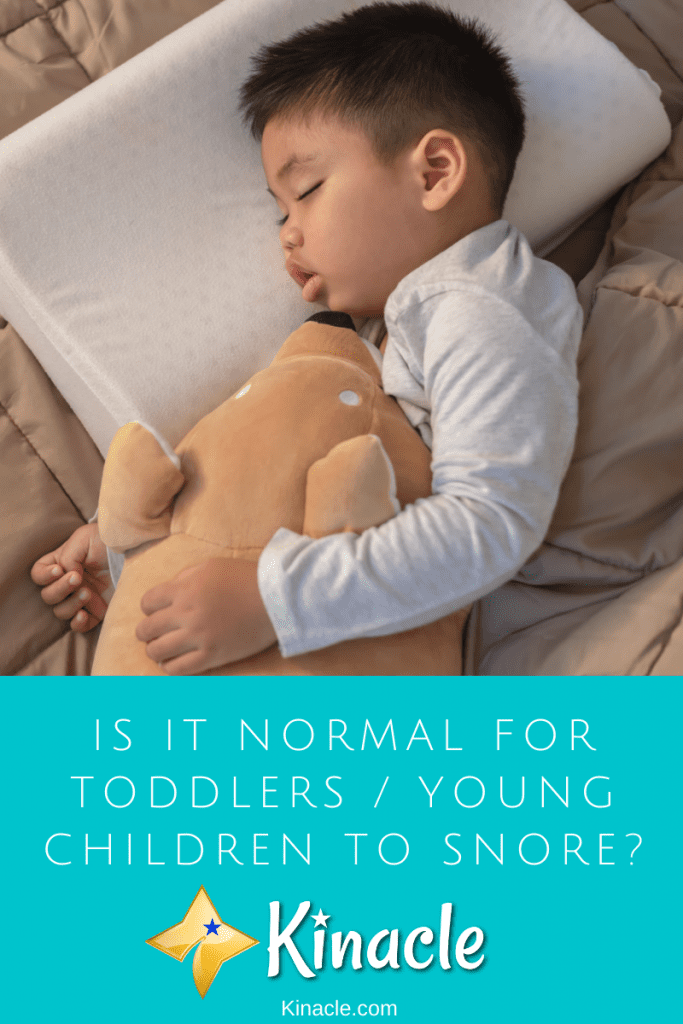
Snoring seems like a common thing that is experienced while a person is in a deep sleep, but in some cases, it is a sign of more serious concern. What if you caught your toddler snoring loudly – is this something to be concerned about? Is it normal for kids to snore while sleeping?
Why Do Kids Snore?
There is a physiological explanation behind snoring that parents need to know – snoring is a sound made by the tissue vibrations at the back of the mouth. Usually, it happens when there is an obstruction that may partially block the airflow in the air passages.
Just like some adults, kids older than 3 years of age may occasionally snore during deep sleep. On this stage of sleep, the muscles tend to be too relaxed and may cause partial blockage in the airways. This is called the “primary snoring” which may normally happen anytime and doesn’t have something to do with airway problems or sleep disorders.
What Causes Snoring in Children?
According to experts, toddler snoring is often attributed to enlarged or excessive tissues in the throat that are causing the obstruction. It is often associated with the following causes for snoring in toddlers:
Large tonsils and adenoids
The tonsils are a pair of glands located at the throat while the adenoids are glands that are situated at the back of the nasal passages. Both of them provide protection by trapping bacteria and viruses before they can enter the lungs. However, in some children, these glands get too enlarged or swollen such that their airflow is already affected.
Large tonsils are among the common reasons for snoring in toddlers because these glands are sized bigger when compared to their small and narrow throats.
Infections in the throat
Similarly, throat infections can make the linings of the throat inflamed and narrowed, causing toddlers to snore.
Asthma, allergies, and colds
Allergies and colds can cause congestion, trigger an inflammatory response, and block the airways. Certain foods and substances trigger asthmatic attacks which can constrict the child’s airways. Snoring is only one of the symptoms of these conditions.
Deviated septum
If the toddler has an uneven nasal septum or the cartilage that divides the two nostrils, it makes the other opening narrower, restricting airflow, and cause snoring. In severe cases, the nasal septum needs to be corrected through surgery to relieve the snoring and improve the child’s breathing.
Additionally, some children are more likely to snore than other kids. Snoring is often observed on children that have any of the following conditions:
- Childhood obesity
- Premature birth
- Physical disabilities in the facial area (like cleft lift and palate)
- Suffering from neurological, muscular, and genetic disorders (such as Cerebral palsy, Down’s Syndrome, or sickle cell disease)
When To Worry About Toddler Snoring
Snoring is often a minor problem that can easily be relieved. Sometimes however, it can be a symptom of a condition called Obstructive Sleep Apnea Syndrome (OSAS).
Aside from snoring, children with obstructive sleep apnea experience several brief pauses with their breathing while asleep. These episodes may last for a few seconds to a minute until the brain reacts to the lack of oxygen, and alerts the child to wake up. Upon waking, the child will struggle to breathe to compensate for the lack of oxygen in the body. These episodes repeatedly happen on the course of sleep, making it hard for the child to get quality rest.
If you have a snoring toddler sleep apnea can be suspected if he shows the following signs:
- Loud and noisy snoring that occurs frequently
- Snorts, gasps, or stops breathing while asleep
- Frequently wakes up throughout the night
- Restless
- Sleep in awkward positions, oftentimes, the head and neck is extended with the mouth open
- Profuse sweating through the night
In addition to these nighttime symptoms, the following daytime signs can be observed among children with obstructive sleep apnea:
- Hard to awaken
- Headache that is more evident in the morning
- Sleepiness in the middle of the day or daydreaming
- Talking with a nasal voice, signifying obstruction
- Primarily using the mouth to breathe
- Issues with their behavior at school or with their social interactions
How To Help Your Snoring Toddler
Occasional snoring is usually not something to worry about. If you hear your toddler snoring, changing their position will usually eliminate the sound vibrations coming from the throat. Techniques to promote good sleeping habits may also help your child feel relaxed all through the night.
If you notice symptoms of obstructive sleep apnea, it is best to seek consultation from a pediatrician right away. Sleep apnea can interfere with your child’s breathing, sleep, and daily performance, so seeking early intervention can help minimize or even prevent its long-term effects.
Your doctor will suggest interventions to reestablish a good nighttime sleep routine for your child. If the reason behind snoring and apnea is enlarged tonsils, the surgical removal of tonsils (tonsillectomy) may be suggested by your doctor to help deal with the problem. If the issue roots from obesity, then a weight loss program can be advised to help your child improve their sleep quality.
Conclusion
Occasional snoring among toddlers is typically not anything you need to worry about. However, in some cases, snoring is a sign that something isn’t right with your child’s airways. If you hear your kids snoring too frequently and you’re concerned that the sound is alarming, it is safer to seek early medical advice.
Disclaimer:
This article is for informational purposes only and should not be considered medical advice. Always consult with a doctor or licensed medical professional before making any medical decisions.
No normal child suffers from snoring and therefore that cannot be taken lightly
Very informative article. Your observations about causes and the remedies suggested are valuable.